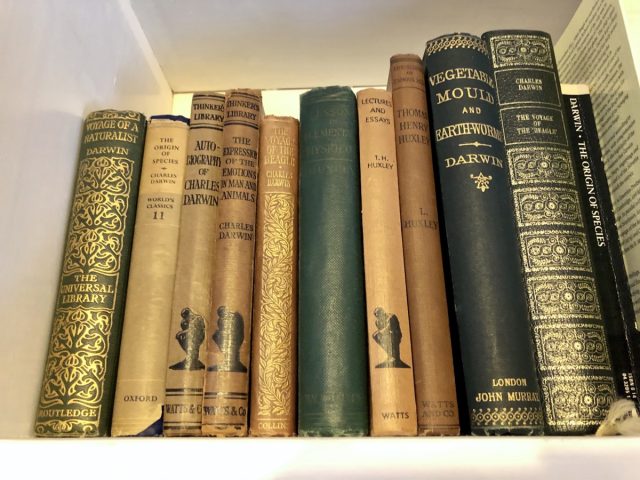The serendipity of reading books…
Having diligently worked my way through the 900+ pages of The Descent of Man for what I felt was essential research for my ‘Darwin book’, I’d promised myself some non-work-related reading as light relief. Then I remembered that, inspired by Richard Mabey’s Turning the Boat for Home, I’d recently half-promised myself to re-read Ronald Blythe’s similar collection of occasional writing, Aftermath. So I dug in.
Among many lovely Blythe pieces, Aftermath contains one written for Slightly Foxed magazine about the once-popular, pocket-sized, hard-backed books that preceded modern paperbacks. To encourage readers to buy full sets, publishers hit upon the brilliant idea of marketing their individual collections as ‘libraries’, the most famous, perhaps, being the Everyman Library. It’s a trick still being used by the likes of the Oxford University Press with their excellent …A Very Short Introduction series of paperbacks. Reading Blythe’s piece reminded me that I own a small number of second-hand Everyman, and Thinker’s Library, and similar books. One of them, Darwin’s The Voyage of the Beagle travelled with me to Australia. Others remain mostly unread, but beautiful, on my shelves—although, in my defence, in most cases, I’ve read more modern, larger-print versions of the same books.
Walking into my study just now, I remembered Blythe’s piece and took a slight detour to admire my collection of these classic hardbacks. As you’d expect, there are several by Darwin: On the Origin of Species, two different versions of The Voyage of the Beagle, his Autobiography, and The Expression of the Emotions in Man and Animals. I also own a biography of, and a lecture collection by, Darwin’s great friend (and ‘bulldog’) Thomas Henry Huxley.

As I was browsing this relatively inaccessible section of my bookshelves, my eyes alit on another second-hand book that I had absolutely no recollection of having bought: a 1996 paperback anthology entitled Charles Darwin On Evolution, edited by Thomas F Glick and David Kohn. Intrigued, I dislodged the book from where it had been unceremoniously wedged and dipped inside. To my horror, some Neanderthal former owner of the book had seen fit to mark various passages with pink, red, orange, and blue highlighter pen, and to scrawl the odd comment in the margin. But, to their credit, they did at least seem to appreciate which were the passages that deserved highlighting.
Of course, it immediately dawned on the that this newly rediscovered book, tucked away on a top shelf, might also provide essential research for my ‘Darwin book’. Thanks for nothing, My Blythe!—although I suppose it serves me right for following my nose.
Browsing your unfrequented bookshelves can be dangerous business.
Leave a Reply